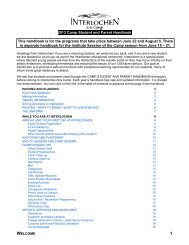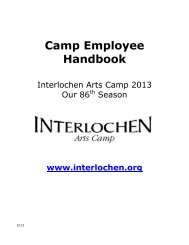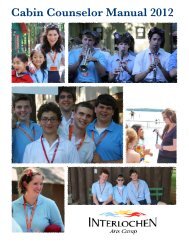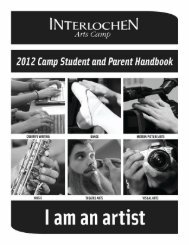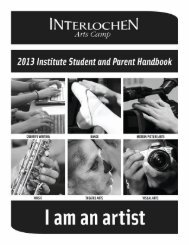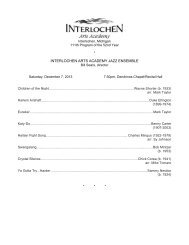Cabin Counselor Manual 2013 Final - Interlochen Center for the Arts
Cabin Counselor Manual 2013 Final - Interlochen Center for the Arts
Cabin Counselor Manual 2013 Final - Interlochen Center for the Arts
You also want an ePaper? Increase the reach of your titles
YUMPU automatically turns print PDFs into web optimized ePapers that Google loves.
Taking Care of Campers<br />
Behavior Management Policy<br />
The <strong>Interlochen</strong> <strong>Center</strong> <strong>for</strong> <strong>the</strong> <strong>Arts</strong> is concerned with <strong>the</strong> total welfare of all its campers. Every ef<strong>for</strong>t is made to<br />
provide a positive environment that fosters <strong>the</strong> fullest development of each camper’s potential, both socially and<br />
artistically.<br />
It is <strong>Interlochen</strong>’s expectation that Camp staff will use positive behavior management as a means <strong>for</strong> prevention of<br />
and intervention with campers’ behavior problems. All employees should understand <strong>the</strong> importance of treating<br />
campers appropriately and humanely, consulting with Camp authorities in any cases in which <strong>the</strong>y are in doubt as to<br />
<strong>the</strong> appropriate treatment, and in<strong>for</strong>ming <strong>the</strong>ir supervisor when a disciplinary incident has occurred.<br />
Camp staff should refer to training manuals and o<strong>the</strong>r documents, provided by <strong>the</strong> Camp and Division Directors, <strong>for</strong><br />
in<strong>for</strong>mation on how to prevent <strong>the</strong> occurrence of behavior problems and <strong>the</strong> appropriate methods to employ when<br />
confronting inappropriate behavior.<br />
In accordance with <strong>the</strong> laws of <strong>the</strong> State of Michigan, it is <strong>the</strong> Camp’s policy that a child shall not, under any<br />
circumstances, be deprived of food or sleep; be isolated (placed alone without staff supervision, observation or<br />
interaction); or be subject to ridicule, threat, corporal punishment, excessive or abusive physical exercise (as a<br />
means of punishment or <strong>for</strong> any o<strong>the</strong>r reason), or excessive restraint, ei<strong>the</strong>r by staff or o<strong>the</strong>r campers. In addition,<br />
campers shall not be subjected to hazing or abusive jokes or pranks ei<strong>the</strong>r by <strong>the</strong> staff or o<strong>the</strong>r campers.<br />
Definitions:<br />
• “Excessive or abusive physical exercise” means exercise without positive behavioral modification value and<br />
so harsh as to be beyond a reasonable person’s comprehension.<br />
• “Corporal punishment” is defined to include spanking.<br />
• “Excessive restraint” means any <strong>for</strong>ce used beyond <strong>the</strong> minimum amount of <strong>for</strong>ce necessary to protect <strong>the</strong><br />
individual or over a longer period of time than is necessary <strong>for</strong> <strong>the</strong> child to regain his/her composure. If <strong>the</strong><br />
methodology/procedure used, in and of itself, causes harm to <strong>the</strong> child, it is defined as excessive.<br />
Campers bring many things with <strong>the</strong>m to Camp including <strong>the</strong>ir learned behaviors. When working with campers, keep<br />
<strong>the</strong> following thoughts in mind:<br />
• Campers, though very talented, are not mini adults. Most are artistically very mature and socially very<br />
young.<br />
• Expect <strong>the</strong>m to test your limits to find where <strong>the</strong> “true” boundaries are located.<br />
• Be a rubber band and not a brick wall. Understand where your good judgment and flexibility are required.<br />
Behavior issues may surface <strong>for</strong> many reasons. If you can identify <strong>the</strong> reason behind <strong>the</strong> behavior, you will know<br />
better how to successfully handle it.<br />
• A desire <strong>for</strong> recognition or attention: It may be better to be infamous than unknown.<br />
• Frustration: Unsatisfied needs or desires can cause campers to lash out.<br />
• Homesickness: Being scared and nervous can often cause frustrations that are outwardly expressed.<br />
• Illness/exhaustion: No one is at one’s best when one is sick, tired and away from home.<br />
• Conflict: Whe<strong>the</strong>r with ano<strong>the</strong>r camper or a staff member, conflict can cause behavior issues.<br />
• Outside conflicts: You never know what issues campers are bringing along with <strong>the</strong> rest of <strong>the</strong>ir supplies.<br />
• Established behavior patterns: Campers bring <strong>the</strong>mselves to camp.<br />
14



